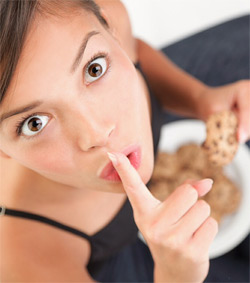
According to a recent poll of 2,000 women, three-fifths admitted that they go into hiding to eat certain foods. 23 per cent confessed to concealing wrappers and burying edible evidence in the bin. One in five of us, the startling survey by LighterLife found, has resorted to hiding food in the boot of the car so nobody else can eat it and then disposing of the packaging, so nobody finds out when we have.
And 35 per cent said that when they have the house to themselves, they see it as their chance to eat what they want without being judged. It seems weve all done it but this fact alone doesnt make it harmless. In fact, hiding food is the beginning of a very slippery slope.
There are 1.6 million people affected by an eating disorder in the UK. I say people, because although incidences are higher among women (most commonly in the age bracket 12 to 28), around 11 per cent of sufferers of anorexia, bulimia or other eating disorders are male. Many are older, too. Some develop problems around food later in life; others have issues that date from childhood and hang over them, untreated and unrelenting.
Around two-thirds of those who have an eating disorder have visited how-to sites and last year campaigners linked these websites with the surge in hospital admissions (up 8 per cent between 2013 and 2014 among school-age girls) for anorexia and bulimia. By fetishing a serious mental and physical illness, experts warned, young peoples lives are being put in grave danger.
When you start hiding food, for whatever reason be it wrappers of snacks youre feeling a bit embarrassed about having eaten (like me), or things youre supposed to have eaten but havent (like Jade and Ruby) youre signalling that youre ashamed of it.
This psychological connection between eating and shame is a perilous one. Start feeling guilty about food, in any context, and you begin to associate it with something you shouldnt be putting in your body. The origins of eating disorders, or food-related anxiety, are complex and still little-understood. But these sorts of emotions are definite warning signs, and, in a vulnerable mindset, risk bedding down.
Katie Lowe, a body language expert, tells me that the problem is endemic.
“We live in a culture of shame, in which bodies are viewed as flawed if theyre not airbrushed, and fat if theyre not perfect. It’s a considerably wider issue that needs to be addressed on a number of fronts, from magazines, movies and traditional media to the online communities that idolise perfection and thrive on snark.
“Unless we address the way we talk about ourselves and each other, and the unrealistic portrayal of women and men across the cultural landscape, eating disorders and poor body image will continue to grow.
You may never have told anyone; or even admitted it to yourself. It may not be easy to stop. But remember this: food is nothing to be ashamed of. And neither are you.